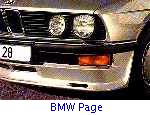 Cadillac
CadillacWhile all the car manufacturers of the world are working feverishly to introduce cars that are safer, better performing, and more fuel efficient, Cadillac designs "to a higher standard". They are pioneers in the auto industry! The hold the distinction for being the first car company to be fined for violating environmental laws laid down in the Clean Air Act.
That's right! The rocket scientists at Cadillac came up with a rather unique solution when their customers came in complaining that their Cadillacs would stall when they turned on the air conditioner. They decided to "fix" the problem by cranking up the engine speed at idle and disconnecting the catalytic converter when you turn on the A/C, spewing hydrocarbons out the tailpipes at three times the rate that the law allows!!
This wasn't some unscrupulous dealership trying to shirk their responsibility to their customers. This was Cadillac Corporation, those people "creating a higher standard" that proposed this solution and tried to inflict it on half a million faithful customers. This wasn't a service they were performing on old cars with outdated pollution-controls systems. This was being done to new cars! New cars with their beloved 4.9-liter engines.
Now most new luxury cars don't just pass the emissions tests. Most new luxury cars "flatline" the testers, that is, the testers you find at an inspection station can't register any pollution. Of course, there is still some pollution by-product of every internal combustion engine, but only the multi-million dollar testers at the factory can detect it. Well, Cadillac doesn't need to buy one of those fancy machines! They'll never have to worry about reading less than 1 part per million hydrocarbons. They can't even pass the lame polution standards devised back in 1981!!
Without further ado, here is the article that announced the decision by the Justice Department:
WASHINGTON -- General Motors Corp. has agreed to recall almost half a million Cadillac automobiles and spend nearly $45 million in fines and other costs to settle government charges that it tampered with pollution-control equipment on the vehicles, the Justice Department said Thursday.
The settlement was the first to mandate auto recalls for violations of federal environmental rules, which were issued under the Clear Air Act.
GM agreed to pay a $11 million fine -- the second largest in the law's history -- and between $7 million and $8.75 million to pay for research into electric cars and other clean fuel technology for such things as low-emission school buses.
The rest -- an estimated $25 million -- will pay for recalling and repairing the polluting cars. The procedure is relatively simple, government officials said, and should take less than 30 minutes.
The agreement is expected to affect 470,000 Cadillacs built from 1991 to 1995 -- including the Seville, DeVille, El Dorado and Fleetwood models -- that were equipped with a 4.9-liter engine.
Federal officials said the problem arose early in 1991, when GM began receiving complaints from Cadillac owners that their cars would begin to stall whenever they turned on the heater or air-conditioner.
After investigating the problem, they said, GM decided to fix it by installing a new computer chip that altered the fuel mixture to make it richer -- with more fuel and less air -- whenever the cars' climate controls were used.
Justice Department officials said while that cured the stalling problem, it effectively disabled the cars' catalytic converters, causing them to spew out between two and three times the pollutants allowed.
Carol M. Browner, administrator of the Environmental Protection Agency, said the installation of the chip represented ``an intentional effort to override appropriate emissions controls,'' pumping 100,000 tons of carbon monoxide into the atmosphere.
Browner said carbon monoxide gas can lead to headaches, impaired vision and increased risk for persons with heart disease.
Thomas P. Carroll, a Justice Department environmental lawyer, was particularly critical of General Motors for continuing to build the chip into the 1992, 1993, 1994 and 1995 cars after discovering the problem in 1991.
The cars are typically driven with the climate control on but, like other cars, when they are certified at the factory as meeting the pollution control standards, they are tested with the systems off. Therefore, the Cadillacs' high pollution levels would not register in those tests, the officials said.
While GM agreed to the settlement, it did so grudgingly.
``We strongly disagree with the allegations made today by the federal government,'' Dennis Minano, vice president of corporate affairs, said in a statement.
[Published 1 December 1995 in the San Jose Mercury News.]



 Garageboy's Home Page
Garageboy's Home Page 